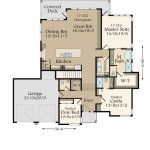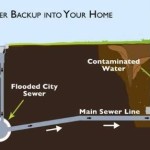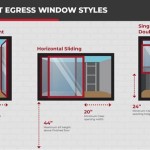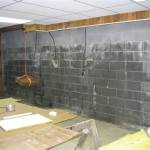Mobile Homes With a Basement: An In-Depth Look
The concept of a mobile home evokes images of portability and streamlined living. Traditionally, mobile homes, also known as manufactured homes, are designed for ease of relocation and are typically situated on a foundation or slab. However, the addition of a basement introduces a new dimension to mobile home living, offering increased space, enhanced protection, and improved property value. This article explores the intricacies of mobile homes with basements, examining construction techniques, benefits, challenges, and regulatory considerations.
Understanding the distinction between mobile homes and modular homes is crucial. While both are factory-built housing options, modular homes are built to the same building codes as site-built homes and are permanently affixed to a foundation. Mobile homes, governed by the Department of Housing and Urban Development (HUD) code, often require different foundation systems. Integrating a basement with either type of home requires careful planning and adherence to local building regulations.
Construction and Installation Considerations
Constructing a basement under a mobile home involves a series of carefully orchestrated steps. The initial stage involves excavating the site and constructing the basement walls, typically using poured concrete or concrete blocks. Proper waterproofing and drainage systems are essential to prevent moisture intrusion and maintain the structural integrity of the basement.
Once the basement structure is complete, the mobile home is carefully positioned and secured onto the foundation. This process often involves the use of heavy machinery and specialized equipment to ensure precise alignment and a secure connection. The mobile home is then anchored to the basement walls, complying with local building codes and manufacturer specifications.
Utilities, including plumbing, electrical, and HVAC systems, are then connected to the mobile home and extended into the basement. This requires meticulous planning to ensure compliance with safety regulations and efficient functionality. Insulation is a critical component during this phase, providing thermal comfort and energy efficiency throughout the mobile home and basement.
Several foundation types can be used for mobile homes, and the selection depends on soil conditions, local climate, and regulatory requirements. Options include a full basement, a crawl space with a concrete foundation, or piers supporting a perimeter skirt. Choosing the right foundation is paramount for long-term stability and resistance to environmental factors.
Benefits of a Basement Under a Mobile Home
Adding a basement to a mobile home offers a multitude of advantages that significantly enhance the living experience and overall property value. These advantages range from increased storage space to improved protection from the elements.
One of the primary benefits is the expanded living space. A basement can be transformed into additional bedrooms, a family room, a home office, or a recreational area, substantially increasing the functional square footage of the home. This is particularly valuable for growing families or individuals who require dedicated space for specific activities.
Basements provide a safe haven during severe weather events, such as tornadoes and hurricanes. The below-ground location offers enhanced protection from high winds and flying debris, providing peace of mind during extreme weather conditions. This feature is especially important in regions prone to such natural disasters.
The addition of a basement can significantly improve the resale value of a mobile home. The increased living space, enhanced protection, and additional storage options make the property more attractive to potential buyers. A well-maintained basement can be a valuable selling point in the competitive real estate market.
Basements also offer substantial storage capacity. They can be used to store seasonal items, tools, equipment, and other belongings, helping to keep the living areas of the mobile home clutter-free and organized. This is especially beneficial in smaller mobile homes where storage space may be limited.
Another advantage is improved energy efficiency. A basement provides an additional layer of insulation, helping to regulate the temperature of the mobile home throughout the year. This can lead to lower energy bills and a more comfortable indoor environment.
Challenges and Considerations
While the benefits of a basement under a mobile home are numerous, there are also challenges and considerations that must be addressed. These include regulatory hurdles, construction costs, and potential maintenance issues.
Obtaining the necessary permits and approvals from local building authorities can be a complex and time-consuming process. Building codes and zoning regulations vary widely, and it is essential to comply with all applicable requirements. This often involves submitting detailed plans and undergoing inspections to ensure that the construction meets safety and structural standards.
The cost of constructing a basement can be substantial, depending on the size, materials, and complexity of the design. Excavation, foundation construction, waterproofing, and utility connections all contribute to the overall expense. It is crucial to obtain accurate cost estimates and factor in potential cost overruns.
Moisture management is a critical consideration for basements. Proper waterproofing and drainage are essential to prevent water intrusion and mold growth. Regular inspections and maintenance are necessary to identify and address any potential issues promptly.
Radon mitigation may also be necessary, depending on the geological characteristics of the area. Radon is a naturally occurring radioactive gas that can seep into basements and pose a health risk. Testing for radon and installing a mitigation system, if necessary, is crucial for ensuring a safe and healthy living environment.
Accessibility is another factor to consider. Building codes may require specific accessibility features, such as ramps or elevators, to ensure that the basement is accessible to individuals with disabilities. This can add to the construction costs and require careful planning.
Insurance coverage for mobile homes with basements may differ from standard mobile home insurance policies. It is essential to discuss the specific coverage options with an insurance provider to ensure adequate protection against potential risks, such as water damage and structural damage.
The value of a mobile home is normally depreciated far quicker than that of a traditionally built house. While adding a basement will help with the value, owners need to be aware of this factor when it comes to selling or re-financing.
Regulatory and Legal Aspects
The regulatory and legal aspects of building a basement under a mobile home are complex and vary depending on local jurisdictions. Compliance with building codes, zoning regulations, and HUD standards is essential.
HUD regulations primarily govern the construction and safety standards of mobile homes themselves. However, the construction of a basement typically falls under the jurisdiction of local building authorities. It is crucial to consult with local officials to determine the specific requirements and obtain the necessary permits.
Zoning regulations may restrict the types of structures that can be built on a particular property. These regulations may specify minimum lot sizes, setbacks, and height restrictions. It is essential to ensure that the proposed basement construction complies with all applicable zoning requirements.
Building codes dictate the minimum standards for construction materials, methods, and safety features. These codes are designed to ensure the structural integrity and safety of buildings. Compliance with building codes is essential for obtaining building permits and ensuring the long-term durability of the basement.
Homeowners associations (HOAs) may also have specific rules and regulations regarding the construction of basements. It is essential to review the HOA covenants and restrictions to ensure compliance with any applicable requirements.
Legal agreements, such as easements and right-of-ways, may affect the ability to build a basement on a particular property. It is essential to conduct a thorough title search to identify any existing encumbrances that may restrict the construction of a basement.
Proper documentation, including building plans, permits, and inspection reports, should be maintained throughout the construction process. This documentation will be essential for future reference and for the sale of the property.
Engaging with qualified professionals, such as architects, engineers, and contractors, is crucial for navigating the regulatory and legal aspects of building a basement under a mobile home. These professionals can provide expert guidance and ensure compliance with all applicable requirements.

Custom Ranch Modular Home On Full Basement Part 1 Youtube

Modular Home On Superior Walls Basement Site Inspection Youtube

Can Manufactured Homes Have Basements Spark

Can Manufactured Homes Have Basements Spark

Can Modular Homes Have Basements

Manufactured Homes Pride Home Sales

Large Double Wide Manufactured Home With Basement Access Youtube

Modular Dream Home By Buffalo Homes

Can Modular Homes Include Basements For Extra Living Space

Homes For Sale In Central With Basement Realtor Com







